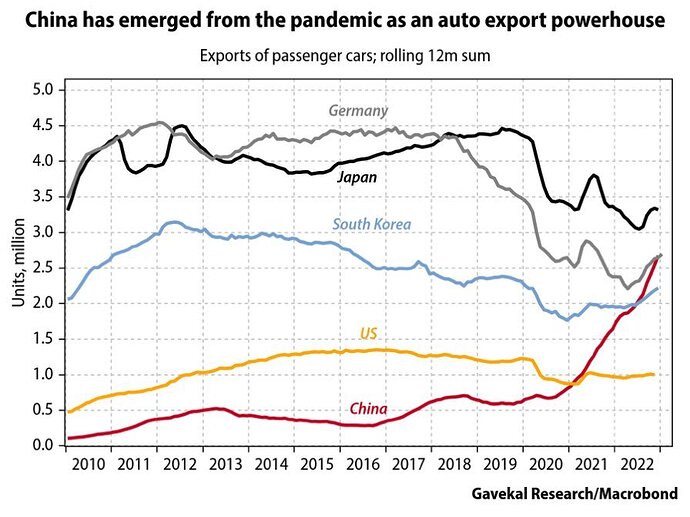I’m actually in favor of this. Maybe with no working military vehicles the US can get out of the empire business.
Mission accomplished!
The West’s superpower has always been building alliances in favor of pure self-sufficiency and mercantilism. But there’s always a balance.
Notice the 30% drop in German auto exports since 2017. Recall that Volkswagen now builds more cars in China than in Germany. Looks like a standard application of China’s very successful plan for overtaking the misled West – first persuade Western manufacturers to build plants in China to supply the Chinese market, and later expand to exporting the same product. In Macron’s recent visit to China, France agreed to build two more Airbus factories in China. How long until Airbus builds more planes in China than in Europe?
Those whom the Gods wish to destroy, they first make mad.
Of course, Airbus was also “persuaded” by the U.S. to build a factory in Mobile, Alabama, to have any chance of winning the U.S. Air Force contract for a tanker aircraft, the EADS/Northrop Grumman KC-45, which they eventually won and then lost when Boeing brought the lobbying hammer down and was awarded the contract to build what became the disastrous KC-46.
In 2012, “persuaded” by the threat of having tariffs slapped on their aircraft at the behest of Boeing, they began to build a factory in Mobile at the cost of US$ 600 million to build the Airbus 320 series. The plant now employs 2,200 people and also assembles the Airbus 220 series, which was acquired from Bombardier Canada.
Consider which scenario is more probable: Airbus ends up exporting aircraft to the world from the US, or from China?
In a contest between a “Free Trader” and a Mercantilist, some elements of the “Free Trader” society get a short-term boost through lower prices (at the expense of other elements of that same society who endure unemployment and reduced prospects) while all elements of the Mercantilist society benefit in both the short & long terms through the transfer of technology and the creation of employment & revenues (some of which will be taxed).
My guess is that, if the planet manages to escape Biden’s thermonuclear war, companies like Volkswagen and Airbus will gradually become Chinese companies, as their R&D and design components migrate to the place that has the manufacturing capabilities, the well-educated skilled workforce, and affordable energy costs.
If anything, it may have been the other way around.*
The specs of the original competition were narrowly tailored to replace the KC-135 and not the KC-10.
On the one hand KC-45 clearly failed some strict requirements on size that were based on being able to use existing KC-135 facilities. But the AF did not penalize, let alone default, Airbus.
On the other hand, there were some threshold requirements that both met but where the KC-45 beat the KC-46 like fuel capacity. The AF gave Airbus bonus points even though the rules said none would be offered.
Boeing quite properly won a challenge.
- This all came after the Darlene Druyun incident. Many in Congress and the press were out to punish Boeing. IMHO, the AF took this as guidance to award the contract to Airbus no matter what the actual competition rules were.
But the fact remains that had Airbus not partnered with Northrop Grumman and planned to build the tanker in the U.S., they’d have had no hope of winning the contract.
As long as we all agree to learn Chinese, Russian, or whatever the aggressor of the day wants us to speak
Was that a Bad Thing?
The Bad Thing is (say) buying the gun barrels for US tanks from Germany, or buying the chips for US fighter jets from China – for very obvious reasons. It is strongly positive for the citizens of the US if a foreign manufacturer decides to set up a facility in the US to make goods to be sold to the US – creates manufacturing capacity, employment, skills, and tax revenues in the US. What is to dislike?
China and the US seem to have adopted mirror image strategies for using access to their very large markets. The US strategy is to import foreign goods in exchange for freshly-printed Bidenbucks, while ignoring the negative impact on domestic US capabilities. The Chinese strategy is to encourage the foreign manufacturer to build a plant in China to produce goods in China for the Chinese market. The evidence seems to suggest that the Chinese strategy is yielding superior results for the Chinese people – especially when those transplanted manufacturers start exporting from China back to their formerly-home nation.
